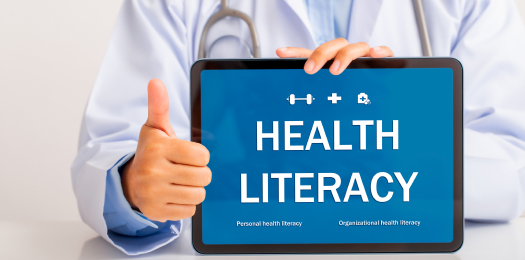
Health Literacy Month
We are the Beneficiary and Family Centered Care Quality Improvement Organization, working to improve the quality of care for Medicare beneficiaries. Our site offers beneficiary and family-centered care information for providers, patients, and families. Welcome!
Improving Your Health Literacy
You may have heard the term “health literacy” used by medical professionals, but what does it mean for you?
Your personal health literacy is how much you are able to find, understand, and use information and services to help you make informed health-related decisions.
This is important, as the greater your health literacy, the easier it is for you to make wise healthcare choices that best benefit you. It isn’t just about knowing what difficult medical terms mean. Instead, it is about knowing when to ask questions, how to speak up about your concerns, and where to get the answers that you need.
As you grow in confidence with your health literacy, you will gain a greater sense of independence and confidence when it comes to your healthcare.
Tips to Help You Be More Involved With Your Own Health Care
Patients who ask questions and make sure they understand the answers tend to get more timely, accurate diagnoses and have better results and peace of mind.
- Here are some tips to use before, during, and after your medical appointment to make sure you get the best possible care: www.ahrq.gov
- You can also download this patient flyer and use it for notes before, during, and after your doctor appointment: Be More Engaged in Your Healthcare (PDF)
- For more information about how to be active in your own health care, including a video and brochure, click on this link (www.ahrq.gov/health-literacy) and scroll down to “For Patients.”
- MyHealthfinder is a prevention and wellness resource from the U.S. Department of Health and Human Services.
In these short videos, patients talk about how simple questions can help you take better care of yourself, feel better, and get the right care at the right time. Doctors and nurses talk about how your questions help them take better care of you. They also give advice about how you can be an active member of your healthcare team and get your questions answered.
Watch the videos: www.ahrq.gov/questions/videos
Resources to Help Healthcare Providers and Stakeholders in Their Work with Patients and Clients
Institute for Healthcare Advancement (IHA)
- IHA's Health Literacy Month website has shareable resources you can use to empower your organization or community.
U.S. Department of Health and Human Services
- Health Literacy Online is a guide that helps you develop health websites and digital health information materials that people can easily access and understand.
- MyHealthfinder is a prevention and wellness resource that you can share with people who have limited health literacy skills.
The Centers for Disease Control and Prevention
- The Understanding Health Literacy web page includes information such as Reports and Evidence on Limited Health Literacy. It also has a link to podcasts, so that you can listen to health literacy leaders describe their research and practice.
- Health literacy training for health professionals.
Information for:
The internet is a wonderful resource to look up things.
However, it is important to find websites with trustworthy information:
- Websites ending with .gov are government sites. For example, www.medicare.gov.
- Websites that end in .org are usually healthcare institutions or organizations providing patient education.
- Websites ending with .edu are usually colleges and universities (e.g., medical schools).